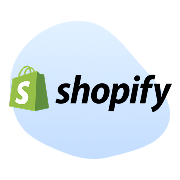

Shopify
Azure SQL Server
Power BI
Shopify Power BI Connector by Vidi is the most convenient solution for integrating Shopify data into your analytics workflow, solving multiple challenges.
We created the Shopify Power BI Connector to seamlessly link your Shopify data with Power BI. Visualise real-time data on sales, customer behaviour, inventory and marketing performance to make informed decisions for your e-commerce business.
Gain insights from Power BI dashboards that are automatically refreshed with the most recent Shopify data. Real-time access to Shopify data in Power BI allows you to track sales, inventory and customer activity as it happens.
Our connector first transfers the data into an Azure SQL Server database and then imports it into Power BI. This approach ensures that SQL Server handles the intensive data processing while Power BI is used for less demanding data tasks.
Design dashboards to display the key metrics that matter most to your business. Effortlessly monitor KPIs such as revenue, customer acquisition and product performance.
Power BI advanced analytics enables you to discover trends, predict sales and uncover growth opportunities.
With Vidi’s Shopify Power BI Connector, you can turn raw call data into actionable insights for smarter decision-making.
Import your Shopify data into any destination using our connector.







Challenge
Sales dashboard for an e-commerce company
An expanding e-commerce company utilised an alternative Shopify Power BI connector. However, they faced significant delays in data loading, which extended the hours required for development tasks.
Solution
We deployed our Shopify Power BI Connector to transfer over 30 GB of Shopify data into an Azure SQL Server database. This eliminated the need for Power BI to handle the resource-intensive process of sending API requests to Shopify, reducing data loading times to under a minute.

Challenge
Geo Analysis for a Global E-Commerce Brand
A global e-commerce brand needed to analyse sales performance by region to adjust marketing strategies.
Solution
The store used our connector that enabled geo-analysis in Power BI. Analysis provided insights into regional sales trends, customer preferences and inventory demand.

Challenge
Financial reporting for a multi-channel retailer
A retailer with multiple sales channels struggled to consolidate financial data from Shopify. This resulted in inaccurate reporting.
Solution
Our Shopify Power BI connector automates data integration, enabling real-time financial dashboards to track revenue, expenses, and profitability across all channels.
We provide a no-code solution that pulls data from the Shopify API into an Azure SQL Server database. Power BI can then connect directly to this database through its built-in Azure SQL Server connector, offering a reliable setup even with large datasets and enabling additional security controls on Azure.
Install
Open our client portal, navigate to the Shopify connector, and press install. This action creates all tables in your selected database, which your data will later feed into.
Connect new company
Connect to Shopify by logging in, and choose any stores you want to include.
Wait for the data to sync
Since the full history needs to be imported, the first refresh will require a few hours. After that, each refresh will complete within minutes. Check the refresh status tab to track the process.

Install our free Shopify Power BI template
Install our free Shopify Power BI template and start visualizing your data in just 5 minutes! You can later customize the PBIX file however you like.
Our Shopify Connector pulls data in an organised format, saving you countless hours in extensive data preparation. You will get ready-made tables including:
Additional customisations are available upon request.
You get a FREE dashboard when you purchase our connector
The template includes the following pages:
Items Bought Together
Old price of the dashboard – $5000
New price – free with the purchase of our connector.
$1400 per year
14 days free trial
Unlimited number of Shopify accounts
Unlimited Customer Support